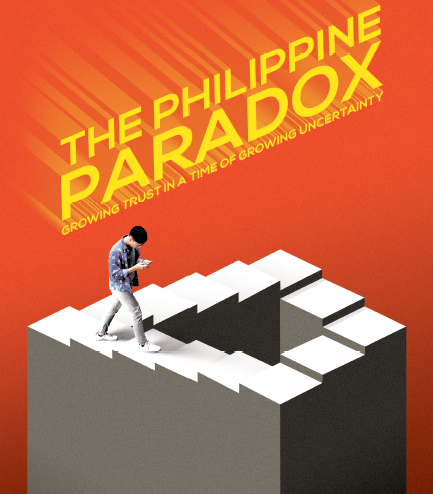Filipinos’ trust in the government dramatically increased in the past two years as church and media, two institutions often lambasted by President Duterte, continued to be regarded highly by the public.
These were part of the findings of the survey conducted by the EON Group from March to April 2017 on the levels and drivers of trust among 1,200 Filipinos aged 18 and above.
The PTI survey, which EON started in 2012, covered six institutions- Academe, Business, Church, Government, Media, and Non-Government Organizations. All institutions improved its trust ratings with government posting a record leap of 30 percent from 2015’s low trust rating of 50 percent to a high of 80 percent this year.
But the church still remains the most trusted at 93 percent even if the trust improved only by one percent from 2015’s 92 percent. Media also remained high at 78 percent, up from 2015’s 73 percent.
NGO gained only moderate trust of 59 percent although up from 40 percent in 2015 when the Janet Napoles scandal with the Priority Development Assistance Fund broke out.
Among government sub-institutions, the Office of the President and Local Government gained the highest trust with 82 percent and 78 percent, respectively. The Office of the Vice President has the lowest rating at 57 percent.
Collectively, the Executive Branch is the most trusted, while the Legislative branch is the least trusted in government, the PTI survey showed.
PTI tried to find out what has the government done to enjoy an increased trust from the people. PTI said, “This year, Filipinos are most satisfied with the institution’s efficacy in putting corrupt politicians in jail (47 percent).”
The government of Pres. Benigno Aquino then contributed to this trust as it put jailed senators Jinggoy Estrada, Ramon “Bong” Revilla, and 93-year old Juan Ponce Enrile (who was released for humanitarian reasons). The Duterte government has imprisoned Sen. Leila de Lima for alleged involvement in illegal drugs,
PTI also said the people appreciates the government’s efforts in preparing communities for disasters and calamities (46 percent), ensuring national peace and security (43 percent) and providing better job opportunities (42 percent).
Press Assistant Secretary Kris Ablan said they are “very pleased” with the results of the survey adding that these will guide them in their continued engagement with the people.
On media, the PTI showed that in this age of internet and social media the general public still trusts traditional media channels – television networks (89 percent), radio stations (85 percent) and newspapers (75 percent) – more than social media sites.
A significant feature of this year’s survey is the use of Groundswell™, EON’s proprietary and award-winning social media listening tool.
EON said PTI looked into social media posts that are relevant to the topic of institutional trust and found that the government (11,394 mentions), the media (3,298 mentions) and the church (2,006 mentions) were the most meaningfully discussed out of the six institutions.
Of the 49 percent of Filipinos who have access to social media, 87 percent believes in the truthfulness of social media sites, while only 73 percent believes in traditional media. Those who trust social media sites tend to believe organic and personal posts by friends and family, and are more doubtful of posts from social media influencers and strangers.
For the first time EON, gave a Most Trusted Communicator award and the overwhelming choice was Jessica Soho of GMA Network.
Of the 1,200 general respondents, 600 are classified as “informed public”- Filipinos who are at least 25 years old with at least three years of tertiary education and who tune in to news updates at least twice a week.
PTI findings about media showed that the public value competence and objectivity. Sadly not many, only 26 percent among the General public and 36 percent among the Informed public believe that the reporters “cannot be bribed.”
Junie del Mundo, CEO and Chairman of EON The Stakeholder Relations Group, said,“The Philippine Trust Index shows us the promise and opportunities in Filipinos’ rising trust in our institutions today. This means that leaders in these key sectors have greater influence but should harness this to help positively improve the daily lives of people in concrete ways.”
Given these realities, del Mundo said “it is imperative for organizations to communicate tangible, relatable truths to engage stakeholders and build trust-based relationships. It is also important to leverage social media in shaping and taking control of the conversations regarding their brands.”
